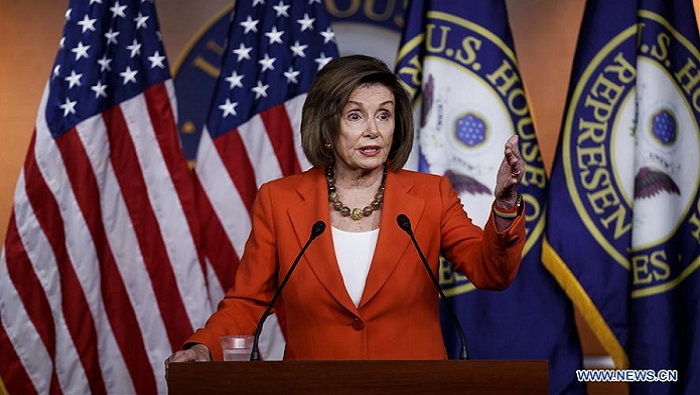
Washington: A divided U.S. House of Representatives voted on Thursday approving a resolution designed to formalize proceedings of an impeachment inquiry into President Donald Trump, setting the stage for what they have called "the next phase" of the investigation, as well as for more political uncertainties and partisan clashes.
The resolution, unveiled earlier this week by the House Rules Committee, was passed 232-196 by the Democratic-controlled House. No Republicans voted in favor of it and only two Democrats voted against it.
According to a text of the resolution, it establishes procedures for public impeachment hearings and the release of deposition transcripts, and outlines the House Judiciary Committee's role in considering potential articles of impeachment.
This was the first time that the House had taken a full chamber vote related to the impeachment inquiry since House Speaker Nancy Pelosi initiated it in late September.
Trump, in tweets Thursday morning, called the impeachment inquiry the "Greatest Witch Hunt In American History," claiming that it was hurting the nation's stock market.
White House press secretary Stephanie Grisham issued a statement in response to the resolution, accusing it of still failing to "provide
any due process whatsoever" to the Trump administration.
The impeachment inquiry was triggered by an anonymous whistleblower who had raised concerns about the White House's interactions with Ukraine, including a July 25 phone call between Trump and his Ukrainian counterpart, Volodymyr Zelensky.
Trump was alleged to have abused power by using a military aid to pressure Zelensky into investigating former U.S. Vice President Joe Biden, a leading 2020 Democratic presidential contender, so as to help his re-election campaign.
Trump has denied any wrongdoing. The White House has dismissed those allegations and made clear that it will not cooperate with House investigators by providing documents or witnesses because it considered the ongoing impeachment inquiry unfair and illegitimate.
So far, the impeachment inquiry hearings have been held behind closed doors before three House panels.
House Republican Conference Chair Liz Cheney on Thursday called it "a process that has been fundamentally tainted."
"The President has had no rights inside these hearings, his counsel has not been able to be present, so from them now to claim they're going to open this up, which, by the way, the resolution does not do," she added.
House Democrats have argued that there is no need to hold a full chamber vote to authorize the impeachment inquiry, citing Constitution stating that the House "shall have the sole Power of Impeachment."
Speaking to a press conference Thursday morning, Pelosi pushed back on Republicans' criticism. "The facts are what they are. They can try to misrepresent them, but the fact is, this is a process that is expanded opportunity for them to show anything that is exculpatory to prove the innocence of the president," she said.
House Intelligence Committee Chairman Adam Schiff said Thursday's resolution will "set the stage" for the next phase of the investigation, where it will be conducted in public.
"We take no joy in having to move down this road and proceed with the impeachment inquiry, but neither do we shrink from it," he said.
However, it's not sure when public hearings could start. House Judiciary Committee Jerry Nadler only said the time for wrapping up the
inquiry "depends, obviously, on how many witnesses, etcetera."
If any of the hearings is held publicly, Schiff will preside, according to the resolution. Schiff and Republican ranking member Devin Nunes are able to engage witnesses for up to 90 minutes and give that time to committee aides to conduct questioning.
Republicans can also request witness testimony and issue subpoenas but those efforts need to be approved by the majority.
Besides, the resolution directs the Schiff's panel to issue a report on its findings and recommendations and send it the House Judiciary Committee, which will consider and draft any potential articles of impeachment. Once the Judiciary Committee completes its hearings and votes on any articles of impeachment, its report would go to the full chamber for a vote.
The president will be impeached if the House approves any of the articles of impeachment by a simple majority vote. But conviction of the
president can only happen in the Senate and requires at least two-thirds of its members, or 67 senators, to vote in favor. Currently, the Senate has 53 Republicans, 45 Democrats and two independents.
"As long expected, the House's impeachment inquiry vote is almost entirely along party lines," Larry Sabato, director of the University of Virginia Center for Politics, tweeted. "Those expecting a bipartisan conviction vote in the Senate once Trump is impeached are living in another time or another universe."